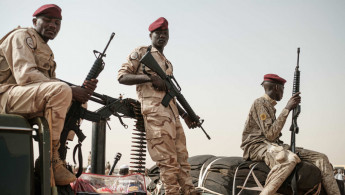Feared Sudan paramilitary force threatens to sue activists over 'fake' social media posts
Activists have claimed that Sudan's Rapid Support Forces is providing humanitarian aid to curry favour.
3 min read
The paramilitary force is widely accused of human rights abuses [Getty]
A feared Sudanese paramilitary force is threatening to sue activists over "false" social media posts claiming it is distributing humanitarian aid, The Sudan Tribune reported.
A spokesman for the Rapid Support Forces (RSF), a paramilitary force accused of widespread human rights abuses by activists and rights organisations, claimed the force was suffering from a campaign to tarnish its image on Saturday.
The legal threats came as photos claiming to show humanitarian aid distrubuted by the feared paramilitary force were widely shared on Sudanese social media.
The images showed bags filled with lentils and rice and emblazoned with the RSF's logo. "Distributed free of charge" was also printed on the bags.
RSF spokesman Brigadier Jamal Juma described the images as "campaigns directed against the forces and their leadership" and said the force would "legally prosecute anyone who dares to impersonate them or use their emblem in any actions intended to threaten the national security or distort their image".
|
|
Sudanese activists on social media claimed the bags were being distributed to poor communities outside of the capital Khartoum in an apparent attempt to curry favour for the paramilitary force with a dark past.
The RSF has its origins in the notorious Janjaweed militias of the Darfur conflict, which were allegedly organised and funded by the regime of former President Omar al-Bashir and stand accused of war crimes, mass rape and genocide.
A former commander of the Janjaweed, Mohammad Hamdan Dagalo rose to international prominence as the deputy leader of the transitional military council that seized power from Bashir in April this year.
Dagalo, better known by his nickname Hemedti, leads the RSF - often known by Sudanese as simply the Janjaweed - and is now a member of the joint civilian-military sovereign council that superseded military rule.
Under Hemedti, the paramilitary force was accused of attacking, raping and killing demonstrators and widespread looting. The group allegedly presided over the June 3 massacre of a Khartoum sit-in camp that killed more than 120 people.
An initial government probe into the massacre saw several RSF troops prosecuted, but shifted blame away from Hemedti, claiming that the paramilitaries involved had not acted under orders. Sudan's Prime Minister Abdalla Hamdok has since ordered an independent investigation.
Before Hemedti rose to power in Khartoum, however, RSF troops were rarely seen in the capital. Their role was instead in Sudan's hinterlands, as both a counter-insurgency and border patrol force.
Human rights organisations have accused the RSF of rights abuses for its treatment of African migrants and civilians in Sudan's Darfur, Blue Nile and South Kordofan conflict zones. Human Rights Watch in 2015 accused the group of forcibly displacing, torturing and killing civilians, mass rape and the destruction of infrastructure in Darfur.
But it is outside Sudan's capital where the force and its commander have attempted to gain influence, activists have said.
Years of economic crisis coupled with a young transitional government has rendered Hamdok slow to respond to citizens in need of aid.
Much of Sudan was faced by devestating floods from July onwards, with the RSF reportedly footing the bill for some flood assistance and aid.
Opposition activists worry that Hemedti harbours presidential ambitions and will use this influence to propel himself to the top spot once Sudan's transitional period is up.
Follow us on Twitter and Instagram to stay connected





 Follow the Middle East's top stories in English at The New Arab on Google News
Follow the Middle East's top stories in English at The New Arab on Google News


